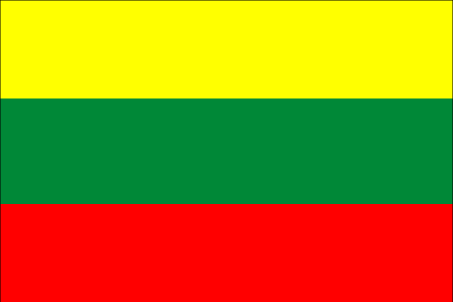Login form
Customs of Lithuania
 Marriage and Family
Marriage and Family
Lithuanians usually marry while in their 20s, but some couples wait until they have more financial security. Because of a housing shortage, most young couples live with their parents during the first years of marriage and may rely on them for financial support for some time. It is becoming more popular to live together before, or instead of, getting married. It is a legal requirement that marriages be performed at city hall, but many couples now also have a church ceremony.
Weddings in rural areas may be quite elaborate, with the celebration lasting two days. Traditional customs are enjoying a resurgence in popularity. One of these involves the groom’s friends having to buy, with candy and whiskey, the bride and groom’s way through a succession of “ropes” of flowers that block the way home from the ceremony, the last of which usually stretches across the gate of the couple’s home. According to tradition, parents meet the newlyweds at the door with bread, salt, and wine glasses filled with water.
The average family has one or two children; larger families are unusual. The father is generally considered the head of the family, but both parents share in raising children and working outside the home. In cities, most people live in apartments, but single-family homes are more common in rural areas. Many people in urban areas own or rent small gardens on the outskirts of cities to grow food and to have a place to relax.
Eating
Lithuanian cuisine has been influenced by many cultures. Traditional specialties include smoked sausage, various cheeses, cepelinai (meat cooked inside a ball of potato dough, served with a special sauce), and vedarai (cooked potatoes and sausage stuffed into pig intestines). Soup is usually served with the main meal.
Lithuanians eat with the fork in the left hand and the knife in the right. People usually eat three meals each day. Breakfast is between 7 and 9 am, the main meal between 1 and 3 pm, and a lighter meal between 6 and 8 pm. In rural areas, meals are eaten earlier than in urban areas. For the midday meal most people either go home or eat in cafeterias at work. Toasts are often made during meals, whether guests are present or not.
Socializing
It is customary when greeting for men to shake hands, but women are less likely to do so. A handshake is nearly always used in professional contacts. When introducing a man, one uses Ponas (“Mr.”) before the last name; for a woman, the term is Ponia (“Mrs.”) or Panele (“Miss”). A person’s professional title is also used before the last name when applicable. Good friends may kiss cheeks. Adults do not use first names with each other until invited to do so, but young people are called by their first names. The most common terms for greeting are Labas diena (“Good day”), Labas rytas (“Good morning”), Labas vakaras (“Good evening”), Labas (“Hello”), and Sveikas or Sveiki (both mean “How do you do?” but “Sveiki” is more casual).
Much socializing in
Recreation
Popular sports include basketball, soccer, rowing boats, volleyball, cycling, tennis, and skiing. Families enjoy camping, and those who live near the coast enjoy going to the beach. Other popular leisure activities include watching television, visiting, and gardening. Cultural events are usually well attended, especially ones involving national dance and song.
Holidays and Celebrations
The official public holidays of Lithuania include New Year’s Day (1 January), the Restoration of the Lithuanian State (16 February), Mother’s Day (first Sunday in May), Easter, the Anniversary of the Coronation of Grand Duke Mindaugas of Lithuania (6 July), the National Day of Hope and Mourning, also known as All Souls’ Day (1 November), and Christmas (25–26 December). Various local festivals are held throughout the year.
Source: Encarta Interactive World Atlas

